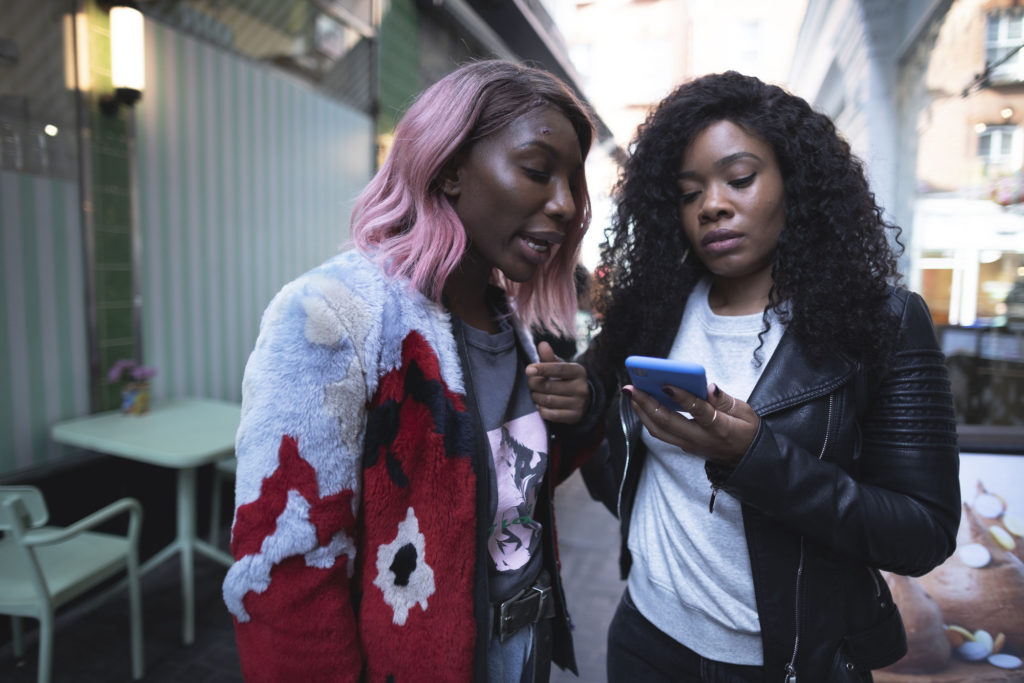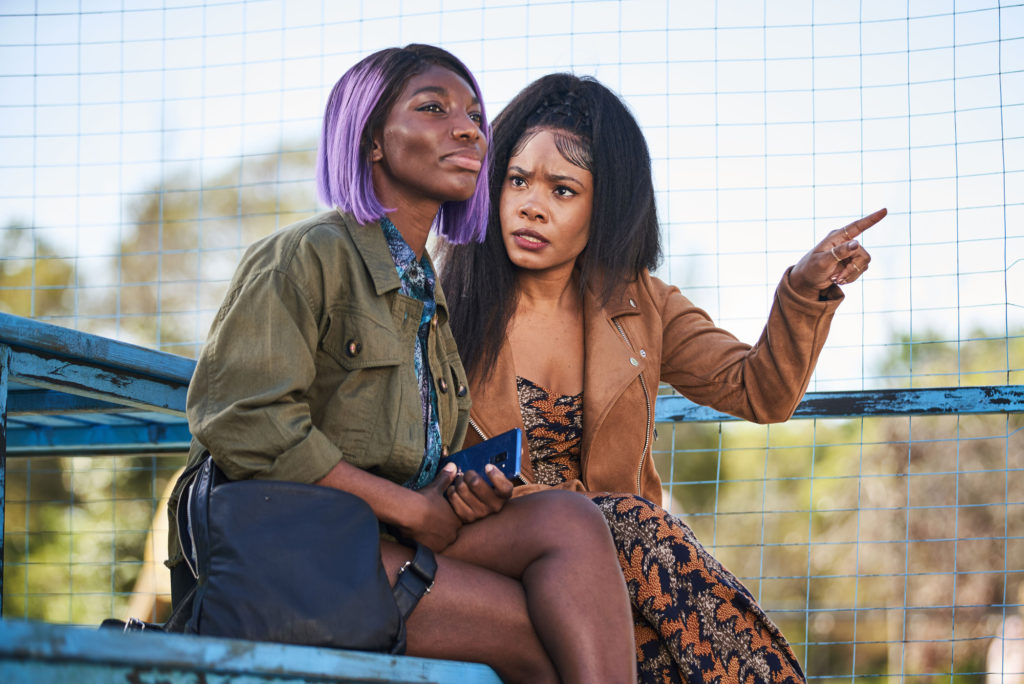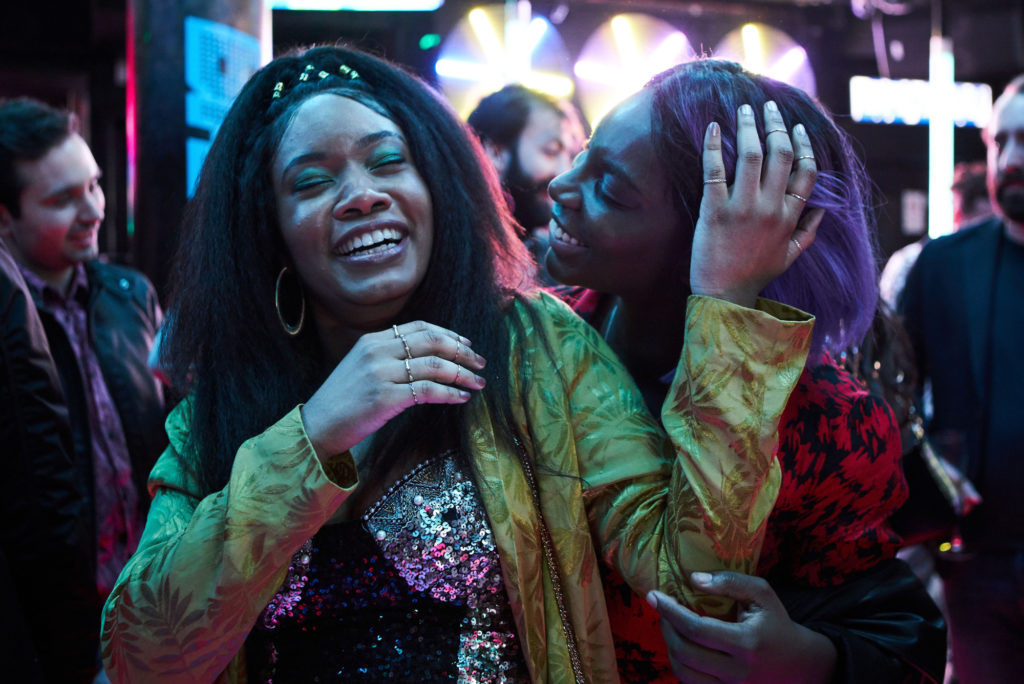
Photography by Natalie Seery
I May Destroy You: Michaela Coel and Weruche Opia on the healing power of black women’s friendships
The charismatic co-stars of the BBC’s new millennial comedy-drama get deep on the tug of war between exploration and exploitation.
Kemi Alemoru
11 Jun 2020
Trigger warning: descriptions of sexual assault and rape
There’s a Janelle Monae lyric in ‘Screwed’ where she chants in sultry tones that “everything is sex, except sex which is power”. I think about this line a lot. In fact, I couldn’t stop thinking about it as I reflected on the new BBC drama I May Destroy You. Written by and starring Michaela Coel, the whole thing is really about power and how young people scramble for control while constantly treading the very thin line that separates exploration, gratification and exploitation: a fuck buddy that refuses to commit, a hookup that leaves you feeling cold, a dream job that actually makes you feel like an inconsequential cog in a capitalist machine.
I May Destroy You will have you oscillating from laughter to tears. It takes notes from Issa Rae’s Insecure playbook of creating a hyperreal representation of being a young black adult, where dark-skinned characters are lit to perfection and the score feels like a Spotify playlist you want to revisit later. However, it is unmistakably a Michaela Coel classic, as she once again introduces us to a character that only she could play.
A part of this rich tapestry of themes and flair, I May Destroy You also gifts us the friendship between Arabella (Michaela) and Terry, portrayed by British-Nigerian actor Weruche Opia. When we speak via Zoom on a baking-hot lockdown afternoon, the chemistry between the pair is palpable despite the dips in connection. “I’d met Michaela once before, when we were in Top Boy when we were about 15. We had one scene together but we actually weren’t on screen at the same time,” Weruche explains. “But when I came in for the last round of auditions and I walked in, I could tell Michaela fell in love with me instantly. You couldn’t stop looking at me.”

As she beams, Michaela interrupts: “I don’t know about that.” They both laugh, and I feel like I’ve infiltrated a BFF catch-up session – the conversation sometimes veering off into personal chatter. Michaela continues: “I fell in love with her when I saw her tape, she played it like a real friend. It was instantly bubbling with this giggly chemistry, everybody saw it in the room, it was delightful, and that basically never stopped.”
Through them we see how important it is to have someone there to support you when you’re thriving as well as when you’re hurting. Arabella is an archetype of the modern thinkfluencer. She’s finding her feet as she adapts to her newfound clout, lauded by strangers in the street and industry bigwigs for her relatable ideas and tweets. With her pink hair, countercultural sartorial taste and penchant for weed (and coke on special occasions), she could be any London-based 20-something one-to-watch. Meanwhile best friend Terry, a struggling actor, is trying to carve out her own path, but (certainly in the first four episodes) spends a lot of time saving Arabella from falling off the edge.
It’s impossible to write about the show without acknowledging how closely it fits with Michaela’s own story of sexual assault. When we meet Arabella, she has a deadline looming, a draft of her hotly anticipated book. As the hours tick away, she becomes distracted and decides to take her procrastination a step further by going for a quick drink with a mischievous friend. Some hazy vision and hindered mobility later, she regains consciousness but something is off. That’s when the flashbacks start. Viewers watch in horror as she begins to piece together an attack in a toilet cubicle.
“The show gave me a different perception of myself and how to work my way out of the aspects of trauma that really weren’t serving me”
All of this mirrors Michaela’s personal revelation of her own “life-changing” ordeal of being assaulted while on deadline for an episode of Channel 4’s Chewing Gum, the comedy that saw her become a household name. She originally revealed the events in the 43rd MacTaggart lecture. However, I May Destroy You sees her deal with the feelings and after-effects of trauma through a fictionalised on-screen character and her wider support system.
“I don’t think I would have been able to find my way out the way that I have had it not been for this show,” Michaela explains. Chronicling her experience in the fictionalised script was cathartic. “The writing did something invaluable for my life and for my perception of the world. It gave me a different perception of myself and how to work my way out of the aspects of trauma that really weren’t serving me.” So we see Arabella chain-smoking spliffs as a comfort blanket and engaging in riskier sex to make herself feel better, even if the dopamine high is short-lived.
Each of us has our own experiences of other women that have soothed and guided us as we navigate our youth, but I struggle to recall a British television project beyond Cecile Emeke’s Ackee and Saltfish (also BBC) that bothered to illuminate the healing power of millennial black women’s friendships. Although a lot of the pain in the script is inflicted by men, it presents women as a lifeline as patriarchy attacks us from every direction. This is especially true in our explorative years: when we’re out partying, we’re told to travel in twos, visit the bathroom together, be thots together but keep each other safe. As Arabella and Terry both become overwhelmed with their own lives, it sometimes looks exhausting.. “You can’t save people – you can sow a seed, as the bible says,” Michaela says, waving her arms in the air. “Ooh, she’s serving them verses!” Weruche laughs as she stretches her hands to the sky in her sun-bleached bedroom.

Yet when Terry leaves Arabella to pursue a threesome on a night out, it’s clear that the code has been broken and there is palpable anger and guilt from both sides. So why include all of these small tensions? “As much as you might be like, ‘Oh, it’s not my responsibility’,” Michaela explains, “it’s not that simple.” She recalls times when she has offered fellow women a helping hand, including a similar incident on a night out when they found a shoe-less woman who could barely speak being approached by two random men. “Me and my friend were like, ‘What the fuck could that possibly be?’ The woman couldn’t articulate anything. She was smiling but she couldn’t quite speak. My friend took off her shoes and gave her her socks so her feet were protected from the concrete. Then we forced a postcode out of her and put her in an Uber. It doesn’t cost me anything to do that.”
Still, being the strong no-nonsense friend can sometimes breed resentment in closer relationships after a while. It’s reminiscent of emotional-labour-template-gate, a conversation on Twitter that saw people argue about whether you should send a stock text to friends in crisis when you can’t deal with them anymore. “Bit harsh,” says Weruche. “Everyone should pull their weight in a friendship.” Michaela agrees: “In my life I’ve had people who have given me a shoulder I could lean on and also I am sometimes so happy to be able to provide a shoulder for someone to lean on. I’ve been rescued so many times by my friends so much.”
“Everyone should pull their weight in a friendship”
While there are many disturbing scenes, the show isn’t short of moments of levity and youthful hedonism. One memorable scene comes as the girls buy some MDMA on their trip to Rome and we have another reprisal of Michaela’s hilarious gurn (first seen in Chewing Gum). “I really love playing drugged-up,” laughs Michaela. While Weruche is clear that she has never actually been on drugs, she describes the experience as “surreal” as everybody lost their inhibitions once the lights dimmed on set. Michaela continues: “When we went into the club [in episode three], we were working with like a hundred extras and none of them were expecting the lead actress to be absolutely bonkers. So they were all just totally ‘What the fuck?!’ and it meant that they all had fun. Everybody was having drug-free fun! I love it, I live for that shit. I basically write it so I can do that.”
However it’s a fair warning to say that each scene characterised by risk and gratification is followed allegorically by something less palatable. In its pursuit of finding refreshing ways to explore the notion of consent and agency, Terry’s threesome after this night out could be interpreted as her own act of defiance, a chance to feel desired and dangerous in a place where nobody knows her. “Terry’s on this holiday pretending to be a different person,” says Weruche. “She consented because she feels in control of the situation.” But there are blurred lines around who truly had the power in the situation as the two men walk off high-fiving after having pretended not to know each other. Coercion is just as much a part of the conversation around consent as the blatant assault that happens to Arabella is. Michaela says she intentionally wants to open the conversation up to the concept of grey areas (a concept that only ever seems to benefit abusers).

This is something that flairs up again when her gay friend Kwame consents to kinky sex with a Grindr admirer but is raped by the same man immediately afterwards. Kwame struggles to know how to report or seek help for what he’s gone through. Showing how these issues present themselves in the QTPOC community came from a real place, as the incident is based on a true story. “That was told to me by an anonymous story consultant,” Michaela adds. “I simply wanted to honour that untold story and that untold pain and untold absolute injustice.” It’s another example of that lank border between empowerment and disempowerment, and how scarily quickly a previously consensual arrangement can turn.
“None of the extras were expecting the lead actress to be absolutely bonkers”
I May Destroy You is sure to start many needed conversations around sex and consent. But perhaps one of its most novel aspects is how true a representation it is to young black British life, especially in the creative industry bubble. It’s rare to watch a show that feels like it really gets you and your experiences – I imagine this is how toffs felt when they lost their marbles over Fleabag. Arabella is a writer but also a professional schmoozer. She’s found enough success to go on expenses-paid holidays and have admirers in her orbit who give her book deals, stop to chat to her at the bus stop and invite her to Shoreditch drinks – but not enough to live without other obstruent housemates. Through it all Terry and her longtime friends act as an anchor as she finds her way.
Then there’s the show’s exploration of the industry’s sometimes scant regard for people who are hurting, something Michaela has personally experienced too. “[In media] there is this idea that you’ve always got to be working, always got to line up the next thing,” she says. “You feel like you need to be on the radar for people to think of you. But I’ve never worked that way.”
After her assault she found her producers didn’t know how to tow the line between empathy and productivity, expecting her to keep working; in the show, it’s no surprise that we see Arabella struggling to finish her book under duress. However, the actor-slash-writer has started fighting back against the attention-as-currency mode of making a name for herself, advocating for the normalisation of taking breaks, focusing on loved ones and dropping off the radar when necessary. “I have no problem disappearing. I actually love letting go of all these things that after a while can become attached to your sense of self: being an actress, being a poet, being a writer. That isn’t actually you – that’s your work.”
Although jam-packed with themes to explore and characters to relate to, I May Destroy You was mostly a vehicle for Michaela to understand her world and the people in it as she pieced it back together. “I wrote every character and conducted every scene from a place of empathy,” she says. “I’m trying to portray a picture of London, I’m trying to reflect London, reflect our world without judgement.” The result is a deftly told tale of life post-trauma that’s equally a paean to young black Britain.







